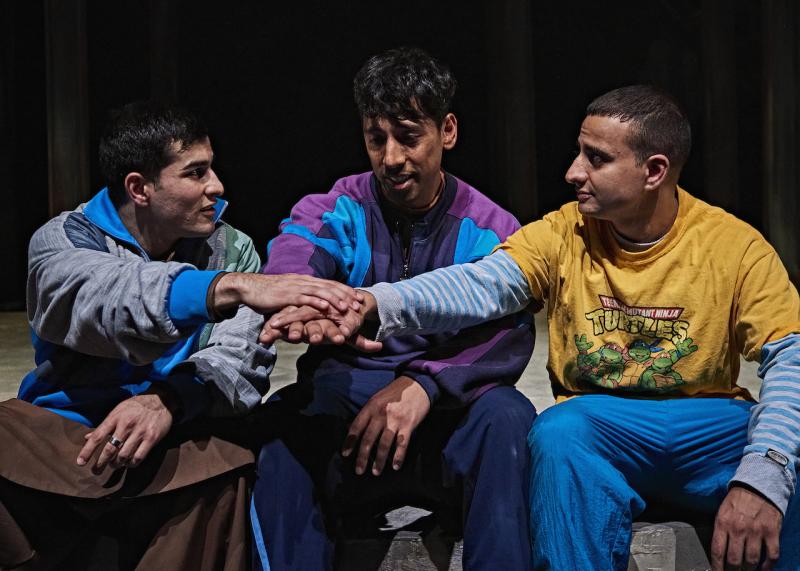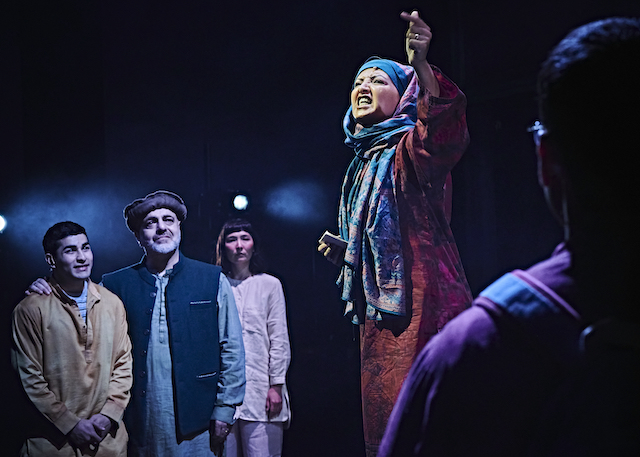The Boy with Two Hearts, National Theatre review - poignant yet humorous story of family forced to flee Afghanistan | reviews, news & interviews
The Boy with Two Hearts, National Theatre review - poignant yet humorous story of family forced to flee Afghanistan
The Boy with Two Hearts, National Theatre review - poignant yet humorous story of family forced to flee Afghanistan
Engaging adaptation and sympathetic playing still leave viewers longing for more detail

It’s particularly poignant to watch this story in the knowledge that a little over a year after US-led troops withdrew from Afghanistan, women and girls are enduring a renewed repression of their rights under the Taliban. The real-life story of The Boy with Two Hearts took place in 2000 – the year before the western invasion began; to see it today is a depressing reminder of how little was achieved through that ill-thought-out venture.
Though the focus of the story is on Hussein – the older brother of narrator Hamed – the dramatic backdrop is the entire family’s forced flight from Afghanistan after the mother delivers a public speech calling for women’s liberation. When the Taliban makes it clear that her life is in danger as a result, the family are forced to sell all their possessions to raise money so they can pay traffickers to spirit them across Europe.
How do you translate this into a piece of theatre that’s as compelling as the story on which it’s based? Hamed Amiri, the middle sibling of the family, wrote a book that was published to huge acclaim from those who were bowled over by a narrative that was as touchingly humorous as it was eloquently direct about the traumas he’d endured.
This theatrical version – adapted by Phil Porter from a version of the book by Hamed and his younger brother Hessam – premiered to favourable reviews at the Wales Millennium Centre in Cardiff. In Amit Sharma’s vivid production we’re welcomed into the gently chaotic Amiri family home, where the dad, Mohammed, is known for his, well, dad-jokes, the mother, Fariba (pictured below, right) is a political firebrand, and the boys are obsessed by American movies and football.
There are great virtues to the simplicity of the narrative. Yet the longer the story goes on the more details you find yourself wanting to know. Hamed was 10 years old when his family was suddenly forced into exile, and the predominant sense here is of a story told primarily so that people of his age group can understand it. There’s a gentle pleasure to watching the teasing chemistry between the brothers, yet for extraordinary dramatic events – such as their father’s arrest and torture by the Taliban – there’s little sense of what’s at stake.
The central theme to the story – of Hussein’s heart problems – is tackled with sensitivity. Just as there’s little sense that his family sees themselves as victims because of the escape they are forced to undertake, we never primarily see Hussein (Ahmad Sakhi) as a patient. In the book, Hamed makes it clear that this is how he himself dealt with his medical condition; admirably he wanted to get on with a normal life and refused to be treated with pity. Hayley Grindle’s set neatly conveys the shifting environments that the family encounter, whether it’s their Herat home, the car boot in which they’re first smuggled out of Afghanistan, or the dreaded Sangatte refugee camp in France. It initially appears as a simple bungalow structure with one main room; as the action progresses hidden compartments and simple projections (in which objects are often playfully depicted by words) give us a sense of how their world is changing.
Hayley Grindle’s set neatly conveys the shifting environments that the family encounter, whether it’s their Herat home, the car boot in which they’re first smuggled out of Afghanistan, or the dreaded Sangatte refugee camp in France. It initially appears as a simple bungalow structure with one main room; as the action progresses hidden compartments and simple projections (in which objects are often playfully depicted by words) give us a sense of how their world is changing.
There’s a nice chemistry between the cast; the relationship between Fariba (Houda Echouafni) and Mohammed (Dana Haqjoo) is credible and heartwarming, while Hessam (Shamail Ali), Hamed (Farshid Rokey) and Hussein (Ahmad Sakhi) make for a congenial trio. But I wanted to know so much more; about the fraught logistics needed to make their epic journey possible, and indeed about how Hussein himself felt about his frightening medical condition.
You leave the theatre feeling nothing but respect for those forced to live this story. Yet this theatrical retelling feels frustratingly underpowered and sadly overshadowed by the new stories emerging daily from a country that once more has proved that, for better or worse, it will always be a law unto itself.
rating
Share this article
The future of Arts Journalism
You can stop theartsdesk.com closing!
We urgently need financing to survive. Our fundraising drive has thus far raised £49,000 but we need to reach £100,000 or we will be forced to close. Please contribute here: https://gofund.me/c3f6033d
And if you can forward this information to anyone who might assist, we’d be grateful.

Subscribe to theartsdesk.com
Thank you for continuing to read our work on theartsdesk.com. For unlimited access to every article in its entirety, including our archive of more than 15,000 pieces, we're asking for £5 per month or £40 per year. We feel it's a very good deal, and hope you do too.
To take a subscription now simply click here.
And if you're looking for that extra gift for a friend or family member, why not treat them to a theartsdesk.com gift subscription?
more Theatre
 Macbeth, RSC, Stratford review - Glaswegian gangs and ghoulies prove gripping
Sam Heughan's Macbeth cannot quite find a home in a mobster pub
Macbeth, RSC, Stratford review - Glaswegian gangs and ghoulies prove gripping
Sam Heughan's Macbeth cannot quite find a home in a mobster pub
 The Line of Beauty, Almeida Theatre review - the 80s revisited in theatrically ravishing form
Alan Hollinghurst novel is cunningly filleted, very finely acted
The Line of Beauty, Almeida Theatre review - the 80s revisited in theatrically ravishing form
Alan Hollinghurst novel is cunningly filleted, very finely acted
 Wendy & Peter Pan, Barbican Theatre review - mixed bag of panto and comic play, turned up to 11
The RSC adaptation is aimed at children, though all will thrill to its spectacle
Wendy & Peter Pan, Barbican Theatre review - mixed bag of panto and comic play, turned up to 11
The RSC adaptation is aimed at children, though all will thrill to its spectacle
 Hedda, Orange Tree Theatre review - a monument reimagined, perhaps even improved
Scandinavian masterpiece transplanted into a London reeling from the ravages of war
Hedda, Orange Tree Theatre review - a monument reimagined, perhaps even improved
Scandinavian masterpiece transplanted into a London reeling from the ravages of war
 The Assembled Parties, Hampstead review - a rarity, a well-made play delivered straight
Witty but poignant tribute to the strength of family ties as all around disintegrates
The Assembled Parties, Hampstead review - a rarity, a well-made play delivered straight
Witty but poignant tribute to the strength of family ties as all around disintegrates
 Mary Page Marlowe, Old Vic review - a starry portrait of a splintered life
Tracy Letts's Off Broadway play makes a shimmeringly powerful London debut
Mary Page Marlowe, Old Vic review - a starry portrait of a splintered life
Tracy Letts's Off Broadway play makes a shimmeringly powerful London debut
 Little Brother, Soho Theatre review - light, bright but emotionally true
This Verity Bargate Award-winning dramedy is entertaining as well as thought provoking
Little Brother, Soho Theatre review - light, bright but emotionally true
This Verity Bargate Award-winning dramedy is entertaining as well as thought provoking
 The Unbelievers, Royal Court Theatre - grimly compelling, powerfully performed
Nick Payne's new play is amongst his best
The Unbelievers, Royal Court Theatre - grimly compelling, powerfully performed
Nick Payne's new play is amongst his best
 The Maids, Donmar Warehouse review - vibrant cast lost in a spectacular-looking fever dream
Kip Williams revises Genet, with little gained in the update except eye-popping visuals
The Maids, Donmar Warehouse review - vibrant cast lost in a spectacular-looking fever dream
Kip Williams revises Genet, with little gained in the update except eye-popping visuals
 Ragdoll, Jermyn Street Theatre review - compelling and emotionally truthful
Katherine Moar returns with a Patty Hearst-inspired follow up to her debut hit 'Farm Hall'
Ragdoll, Jermyn Street Theatre review - compelling and emotionally truthful
Katherine Moar returns with a Patty Hearst-inspired follow up to her debut hit 'Farm Hall'
 Troilus and Cressida, Globe Theatre review - a 'problem play' with added problems
Raucous and carnivalesque, but also ugly and incomprehensible
Troilus and Cressida, Globe Theatre review - a 'problem play' with added problems
Raucous and carnivalesque, but also ugly and incomprehensible
 Clarkston, Trafalgar Theatre review - two lads on a road to nowhere
Netflix star, Joe Locke, is the selling point of a production that needs one
Clarkston, Trafalgar Theatre review - two lads on a road to nowhere
Netflix star, Joe Locke, is the selling point of a production that needs one

Add comment